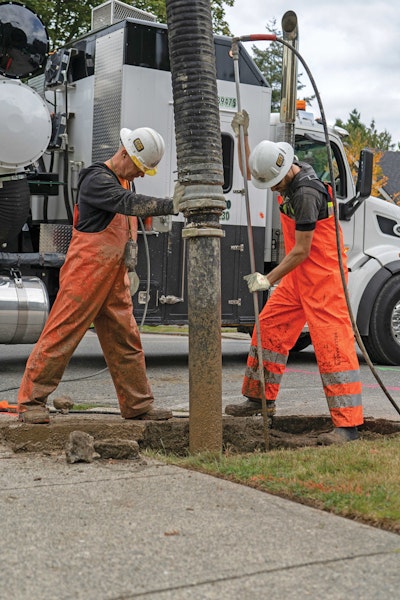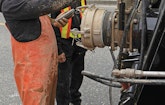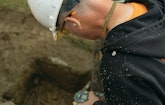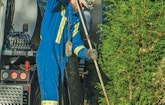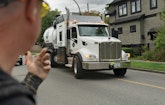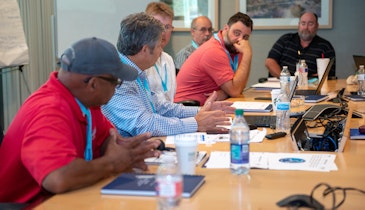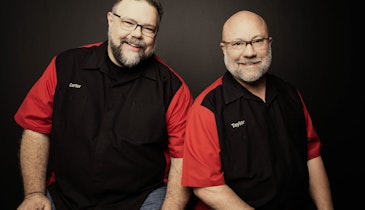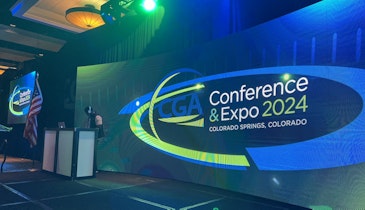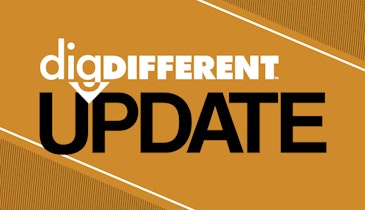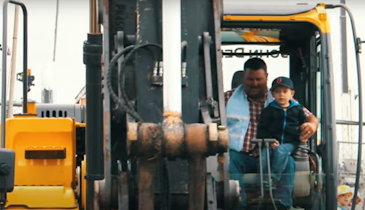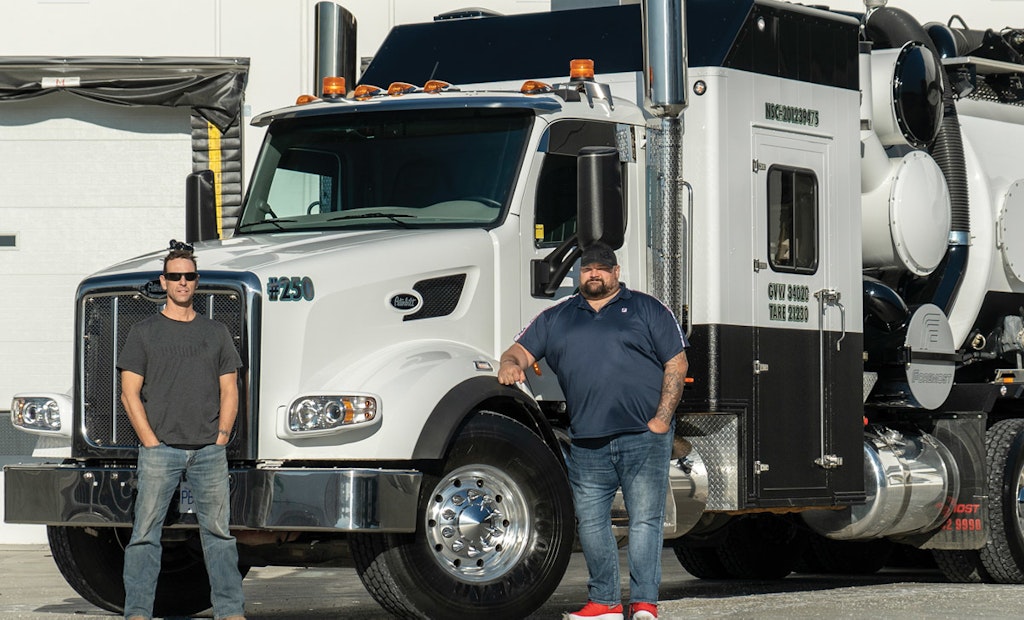
West Coast Hydro Services owner Chad Porter (right) stands with operations manager Ezra McKenzie near one of the company’s Foremost Industries hydroexcavation trucks.
Interested in Vacuum Excavation?
Get Vacuum Excavation articles, news and videos right in your inbox! Sign up now.
Vacuum Excavation + Get AlertsSpend some time talking with Chad Porter and one thing comes across loud and clear: The owner of West Coast Hydro Services doesn’t fit the mold of a stereotypical hydroexcavation guy.
Take the custom-tailored overalls he buys for his “swampers,” for instance, paired with matching hard hats and undershirts. Or the company’s gleaming, frequently washed trucks. Or the supersized blowers he specs for his three rigs. Or the Instagram account he regularly updates to market his company’s services.
Virtually everything the 44-year-old hydroexcavation veteran does is based on one simple principle: Be different and stand out from the competition.
So far, the emphasis on differentiation has served the company well. Since its inception in 2005, the company — based in Port Kells, British Columbia, a far southern suburb of Vancouver — has grown from one to three hydrovac trucks and from one to eight employees.
And but for the scarcity of qualified labor, a problem to which many contractors can ruefully relate, those numbers would be larger, Porter notes.
“Our business has grown substantially, but we’re subbing out a lot of work right now,” he explains. “Buying more iron is the easy part. The hard part is finding guys.
“Everyone thinks they’re an operator but they’re not,” he continues. “Bigger companies can absorb employee screw-ups every week, but I can’t. So we’re very careful about who we hire.”
About 80% of the company’s revenue comes from smaller “daylighting” jobs, exposing underground lines while working for municipalities, utilities and general contractors.
“I don’t go after the big projects anymore,” he says. “I like the bread-and-butter stuff because it’s out there every day. There are a lot of big companies out there that chase big-dollar projects, where their guys are gone for six months.
“Then they come home and the company can’t get those smaller customers back,” he adds. “I like this kind of work because every day you’re on a different hole — it’s always something interesting and fun. And you’re not beating up your trucks every day.”
The focus on smaller jobs also leads to some bizarre work, like the time Porter was asked to excavate a cemetery plot so officials could exhume a body for DNA testing for a 25-year-old murder investigation, he says.
DEEP INDUSTRY ROOTS
Porter got an early start in the industry when he quit high school in ninth grade and went to work for an uncle who was a consultant on pipeline projects. By age 18, he earned a commercial driver’s license and learned how to operate a hydroexcavation truck.
Over the next 20 years or so, Porter bounced around the industry, working for a variety of hydrovac companies, gaining experience and observing what worked and what didn’t work. He made his big move in 2005 when he bought his own rig and started a hydroexcavation company in Kamloops, even though a large, well-entrenched competitor dominated the market.
“I was tired of working for other companies and saw an opportunity,” he says. “Everyone told me it was crazy — that it would never work because this other company had been established in the market for more than 30 years.”
Porter ultimately sold the company’s trucks to his business partner, who was going through a divorce and didn’t want to get Porter embroiled. For several years, Porter then ran a franchise hydroexcavation business and operated West Coast as a consulting outfit. That changed in 2009, when he bought a truck and started doing hydrovac work again.
The company’s new focus on smaller, short-term projects helped Porter attract and retain employees.
“All of us are in our 40s and would rather not work 17-hour days on a pipeline project,” he notes. “My goal is to build a mom and pop operation with a crew of studs — above-average, good guys that know each other and each others’ lives. I don’t want to be like a big corporation.”
GAINING, RETAINING EMPLOYEES
Investing in top equipment that’s efficient and reliable is one way that Porter attracts and retains employees. “When guys see the equipment we operate and how we maintain it, they’re more likely to come on board,” he says. “Our trucks are gleaming every day. We even clean the tires.
“Customers usually mention how shiny they are,” he continues. “They really stick out, which is just another way of differentiating our company from competitors.
“Most times you’d never know our trucks were deep in mud the day before,” he adds. “And when they’re that clean, it’s much easier to spot leaks, too.”
The company owns three hydrovac trucks. Foremost Industries built two of them on Peterbilt 567 chassis with a 13-cubic-yard debris tank, a 1,900-gallon water tank and a Robuschi 145 blower (6,450 cfm). One has a water pump built by Pratissoli (a brand owned by Interpump Group of S.p.A.), which generates 3,200 psi at up to 15 gpm; the other relies on a pump made by Cat Pumps (3,200 psi at 15 gpm).
Tornado built out the third rig on a Peterbilt 567 chassis. It’s equipped with a 13-cubic-yard debris tank, a 1,500-gallon water tank, a Robuschi 145 blower and a Cat water pump.
Porter also uses blowers to differentiate his company. He says the Robuschi 145 is the biggest blower Robuschi makes and customers appreciate that he brings extra vacuum muscle to job sites.
“A lot of guys have trucks without big blowers,” he says. “When customers see ours, they say, ‘Wow — that’s a real hydrovac truck.’”
Porter also uses Ripsaw rotating turbo nozzles from Hydra-Flex and nozzles made by Suttner America Co.
CUSTOM CLOTHING
Another point of differentiation: Rig operators wear custom-tailored coveralls made by Winner Garment Industries Ltd. in Edmonton.
“They send someone out here with a measuring tape,” Porter says of the coveralls, which are gray with green stitching. The green stitches complement the company’s green and white trucks as well as the green undershirts and green hard hats worn by workers.
The end result is a professional image that also reinforces the company’s color scheme/logo, part of an integrated branding effort, he notes.
Porter knows first-hand that the color-coordinated clothing gets noticed. In one instance, a West Coast crew was working at BC Place, a stadium in Vancouver, British Columbia, in preparation for the Grey Cup, the championship game for the Canadian Football League.
“A guy that worked for the general contractor that hired us said, ‘We have almost 500 subtrades working in the building today, and you’re the only guys with matching uniforms,’” Porter says. “All the other crews looked like a pack of Life Savers — all different colors. But not us. We really stood out.”
Where does all the marketing savvy and know-how come from? Porter isn’t sure. “I just know how to make something look good without over-doing it,” he says. “I’m just kind of weird like that.”
HANDS-ON APPROACH
Two other things also help Porter retain employees: Higher-than-average pay and an old-school willingness to get his hands dirty out in the field with his team. Porter believes that employees who are paid well treat equipment better and buy into his keep-trucks-clean mentality.
As for working side-by-side with employees, Porter says it pays dividends when bosses and supervisors are willing to do whatever they ask their employees to do.
“I’ve built a good reputation in the industry,” he says. “I’m hard on people, but they still respect me at the end of the day. That’s because I don’t sit in an office all day and bark out commands. I’m still in the truck for 18 hours a day — definitely a hands-on guy. And that makes a 100% difference to my guys.”
Porter also believes his passion for hydroexcavating makes a difference to employees. He loves the work because it’s different every day, as well as challenging.
“You might be digging a hole every day, but it might be in different kinds of soil or different things you’re looking to uncover,” he says. “Sometimes it’s like playing a video game.
“Some days you just can’t find the hole and one of my swampers wants to take the wand and I say, ‘No, no, no — I want to find it.’ It becomes a challenge. I’m a problem-solver and I take a lot of pride in that.”
Porter credits his crew for much of the company’s success, noting that a company is only as good as its employees. “Because I’m a hands-on owner, sometimes running a truck for 18 hours, day-to-day operations can be hectic,” he explains. “But I have a very solid crew of guys that help make it all worthwhile and Mikaya Hampton and Shilow Bennett in our office are the glue that holds everything together.”
ROOM FOR GROWTH
Porter wants West Coast to maintain its slow-but-steady growth track, but points out that scarce labor is a definite obstacle. On the other hand, he doesn’t want to grow so big so fast that he can’t provide quality work and customer service.
“I have buddies that grew to 400 and 500 trucks and they made millions of dollars when they sold out,” he notes. “But ask them if getting that big was worth it, they’ll say no. I hear that all the time from guys with bigger companies. I’d rather remain a mom and pop sized operation.”
But no matter what size West Coast is in the years ahead, one thing is certain: Porter will keep doing things differently as much as possible.
“Do I have to go out and polish the trucks or buy the guys custom overalls?” he asks. “Not really. I could be just as successful without all that.
“But I want to be different,” he continues. “I want people to talk about our trucks and our coveralls and our Instagram posts. What I’m doing definitely is working. When people respond to those things every day, you know you’re doing something right.”
